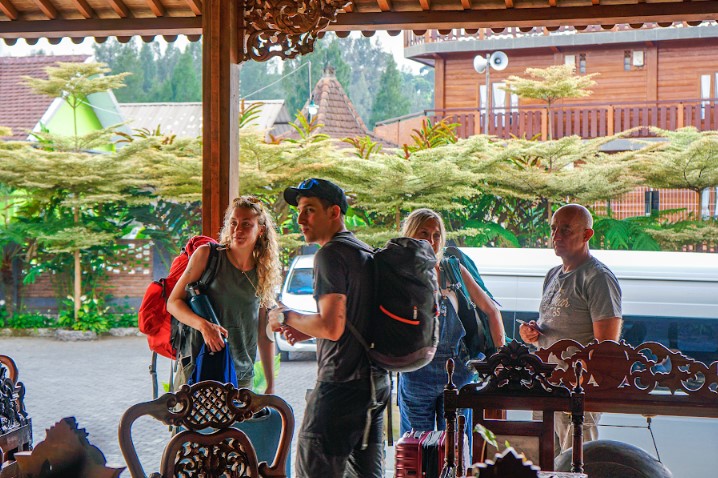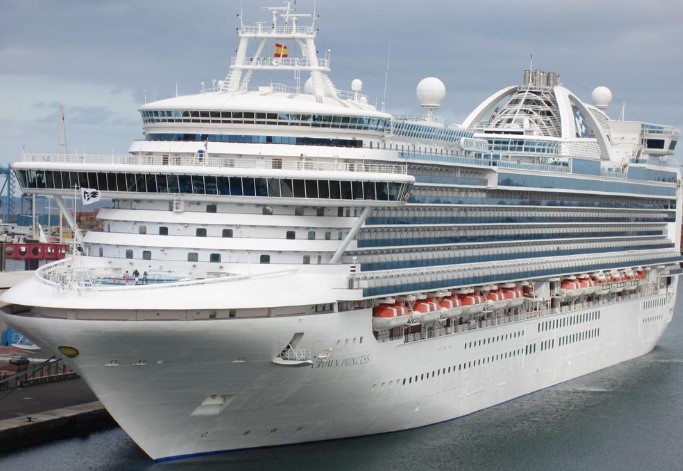In the latest air travel news, the U.S. government must decide soon whether to extend its mask mandate for passengers; debate heats up again about putting unruly travelers onto a federal no-fly list; the war on Ukraine could complicate international travel if Russia bans overflights of its territory; entry rules change for trips to Israel, Iceland, Italy and Belgium; international route news from American, Virgin Atlantic, United and Air Canada; Delta enhances its FlyReady digital tool for customers; and San Francisco International adds another COVID testing facility.
As a sharp decline in COVID cases leads more U.S. cities, counties and states to lift their mask mandates, the federal government is facing a big decision in the next couple of weeks: What should it do about its mask mandate for air travelers, who are currently required to wear face coverings on planes and in airports? That mandate is currently in force through March 18, and it is the subject of an increasingly vocal debate. Two months ago, Dr. Anthony Fauci said in an ABC-TV interview that ending the mask mandate for air travel “is really not something we should even be considering” after a couple of airline CEOs argued that it probably wasn’t necessary. He also suggested that a vaccine mandate for domestic flights might be appropriate. But that was before the omicron surge peaked and declined, and mask mandates started to disappear right and left. Last summer, Sen. Rand Paul, R-Ky., introduced a bill that would force the Biden administration to drop the airline mask mandate, and last week he said in a TV interview he hopes to force a vote on the stalled legislation. In another development last week, Texas Attorney General Ken Paxton and a Texas member of the U.S. House of Representatives filed a lawsuit seeking to force an end to the federal mask requirement for air travel. The federal mandate was imposed by the Transportation Security Administration in early 2021 and has been extended three times.
The Association of Flight Attendants-CWA, representing cabin crews at 20 airlines — expects there will be an extension of the rule. The union told the New York Times this week that allowing all passengers to fly unmasked could present health risks to individuals who are at high risk of infection and to children under 5 who are thus far too young for COVID vaccinations.
On the other hand, flight attendants might derive one major benefit from ending the mask mandate: It could eliminate the single greatest factor in the huge increase in unruly passenger incidents. Most of those cases have been attributed to passenger outrage over having to wear a mask.
Delta CEO Ed Bastian, who has emerged as a leading supporter of adding seriously disruptive passengers to the government no-fly list, doubled down on that stance this week in a Washington Post op-ed. He said that anyone “convicted of a crime because of an onboard disruption” should be put on a national no-fly list. While individual airlines are already putting such customers on their own internal no-fly lists, “we’ve seen cases in which unruly passengers have simply switched airlines and continued to fly even after endangering flight safety. While each airline can take initiative and do its part, only a comprehensive list overseen by the federal government can close the loopholes and prevent disrupters from flying,” Bastian wrote. The Association of Flight Attendants-CWA also wants out-of-control fliers put on a national no-fly list. The union said in a statement last week that it wants to see “a centralized list of passengers who may not fly for a period of time after being fined or convicted of a serious incident.” Late last year, TSA said it would refer the most egregious unruly passengers to the Justice Department for federal criminal prosecution, and so far it has done that with 80 individuals.
That statement from the flight attendants’ union was issued in response to a letter on the issue sent to the Justice Department by eight Republican senators, including Ted Cruz and Marco Rubio. They told that DOJ creating a no-fly list that includes passengers who are “skeptical” of the mask mandate “would seemingly equate them to terrorists who seek to actively take the lives of Americans and perpetrate attacks on the homeland.” They noted that TSA was created after 9/11 “to protect Americans from future horrific attacks, not to regulate human behavior onboard flights.”

Near empty streets are seen on Feb. 24, 2022, in Kyiv, Ukraine. Overnight, Russia began a large-scale attack on Ukraine, with explosions reported in multiple cities and far outside the restive eastern regions held by Russian-backed rebels.
Chris McGrath/Getty ImagesRussia’s invasion of Ukraine this week and the retaliatory sanctions by Western governments could lead to disruption of airline service on some routes — especially if Russia decides to ban overflights of its air space. It’s no surprise that the war has led civil aviation authorities to ban flights over and close to Ukraine, but actions of individual governments against Russia could lead to retaliation affecting flights. For example, the United Kingdom this week banned Russia’s Aeroflot from flying to the U.K., leading Russia to ban British carriers from flying to or over its territory — creating routing problems for the latter’s services from London to India and eastern Asia. In the U.S., Delta said Friday that it has withdrawn its code-share services operated with Aeroflot. “We have removed our code from Aeroflot-operated services beyond Moscow’s Sheremetyevo Airport and removed Aeroflot’s code from Delta-operated services from Los Angeles and New York-JFK. Accommodations will be made for customers affected by these changes,” Delta said. Delta does not fly to Russia but some of its partner airlines do.
Last October, the U.S. State Department secured additional Russia overflight rights for United, Delta and American for their long-haul networks (e.g., United uses them on routes to India, South Korea, Japan and Taiwan). An article last month in Defense One noted that in 2019, more than 300,000 flights went through Russia’s airspace. What if Russia cut them off? “Longer routes resulting in longer flights, stopovers for refueling, and loss of historic slot rights: this is precisely what would happen if Russia were to revoke Western airlines’ overflight rights,” the analysis concluded. “Imagine hundreds of thousands of flights every year forced to fly longer routes, which would result in even longer travel times as some longer routes would have to include stopovers.” Reuters reported this week that Anchorage Airport has been fielding inquiries from airlines about whether it could handle more aircraft making stops to and from Asia if Russia bans overflights.
Israel plans to reopen to all foreign visitors effective March 1 — including unvaccinated visitors. The country is currently accepting vaccinated travelers and those who have recovered from COVID. But starting next week, unvaccinated people will be allowed in as well. The nation’s new rules require all visitors — vaccinated or not — to show a negative result on a PCR test before departure from their home countries, and to take a second one after arrival. Then they’ll have to self-isolate for 24 hours to wait for a negative result on the second test.
The European Commission this week suggested member nations should consider ending temporary entry restrictions on non-essential travel for persons who are fully vaccinated or have recovered from COVID in the past three months. Some countries have already done that, as we’ve been reporting, and more are stepping up as well. This week, Iceland went even further and dropped all its COVID restrictions, both internally and at the border. “No disease prevention measures will be in place at the border, regardless of whether individuals are vaccinated or unvaccinated,” Iceland’s Ministry of Health said.
Italy said that as of March 1, arriving travelers from non-E.U. nations will be subject to the same requirements as European citizens, as it removes its ban on non-essential travel and its mandate for a pre-entry COVID test. Instead, visitors must meet only one of three conditions: a vaccination certificate, recovery certificate, or a negative test. Belgium has adopted the same rule, requiring just one of those three standards for entry.
Even though the COVID omicron variant was still raging in January, it looks like U.S. travelers were already anticipating its end as they started to book airline trips in greater numbers. According to the Airlines Reporting Corporation (ARC), which serves as a clearinghouse for tickets sold through travel agencies, total airline sales through agencies during January jumped 17{32bc5e747b31d501df756e0d52c4fc33c2ecc33869222042bcd2be76582ed298} over December — and were up 187{32bc5e747b31d501df756e0d52c4fc33c2ecc33869222042bcd2be76582ed298} over January of 2021, to $3.6 billion. The January growth in international trips outpaced that of domestic trips, 33{32bc5e747b31d501df756e0d52c4fc33c2ecc33869222042bcd2be76582ed298} vs. 21{32bc5e747b31d501df756e0d52c4fc33c2ecc33869222042bcd2be76582ed298}. “January’s air travel data is encouraging,” said ARC VP of global sales Steve Solomon. “We expect continued recovery as more governments drop mandates and travel restrictions due to the omicron variant receding as well as a bounce in corporate ticketing. As we look ahead to spring travel, some of the historically popular destinations are showing booking numbers closer to pre-pandemic years, and in some cases, exceeding those levels.”
Two months ago, American Airlines announced plans to cut back on some international services this year due to delays in the delivery of new 787-8 aircraft that were attributed to production problems at Boeing. Now the airline is conceding that those aircraft delays are still weaking havoc with its summer 2022 schedules, as it announced even more international cutbacks. American said in an SEC filing that it now expects to receive only 10 787-8s from Boeing this year instead of the 13 it had been counting on. As a result, the airline plans to “temporarily suspend” service from Seattle to London; Dallas/Fort Worth to Santiago, Chile; and Los Angeles to Sydney. American said it will also delay the introduction of DFW-Tel Aviv flights, previously scheduled for June; and cut capacity between Miami and Sao Paulo to one daily flight.

A Virgin Atlantic 787-9 will operate the carrier’s revived SFO-London route beginning in early August.
Virgin AtlanticVirgin Atlantic, citing a 50{32bc5e747b31d501df756e0d52c4fc33c2ecc33869222042bcd2be76582ed298} increase in bookings over last year, said this week it will reinstate its “full portfolio” of U.S. destinations for the first time since the pandemic started. The carrier plans to start flying from London Heathrow to Seattle and Washington Dulles next week, operating five flights a week on both routes, and to increase frequencies to San Francisco, Atlanta and New York. Virgin also plans to add a third daily Los Angeles-London flight in April. The carrier previously announced it will add a London-Austin route on May 25 with four weekly flights. In other international news, United has started Washington Dulles-Dublin service and expects to boost its Newark-Dublin schedule from one flight a day to two beginning April 24. United’s Ireland operations are also slated to get Chicago-Dublin flights beginning March 27 and Newark-Shannon service as of March 28.

Air Canada flies the 737 MAX 8 between San Francisco and Toronto.
Air CanadaAir Canada plans to resume some California routes this spring as part of a big increase in its international operations. The airline said it will start daily flights between San Francisco International and Edmonton on May 1, daily service between Sacramento and Vancouver on June 1, and three flights a week between San Diego and Montreal beginning May 20. Other cities in the western U.S. gaining Air Canada service include Seattle, with daily Montreal flights starting May 31; Portland, with four weekly flights to Toronto as of June 27; and Phoenix, with two flights a week to Montreal beginning May 3. Air Canada also plans to begin a new route to Salt Lake City from Toronto starting June 2, with three weekly flights. Other new U.S. routes beginning June 1 include Vancouver-Austin, Montreal-Detroit and Montreal-Atlanta. The airline also said it will resume service on 34 trans-Atlantic and trans-Pacific routes for the summer season. From Vancouver, that will include service to Frankfurt starting May 1, Dublin beginning June 1, and Zurich effective June 17.
In other California route news, American Airlines’ latest plans for expanding its fast-growing operation at Austin Bergstrom Airport in Texas include the introduction of a new route to Orange County Airport in Santa Ana starting June 3. The airline said it will also start Austin-Bozeman, Montana flights on June 4 and will reintroduce seasonal service from AUS to Destin-Fort Walton Beach, Florida, on the same date.
Delta said it has enhanced its FlyReady digital tool for international passengers to ease their way through constantly changing entry requirements at various destinations. Immediately after booking, Delta said, customers will be able to see both outbound and inbound requirements for entry to their destination. It will also use links to personal passenger information in the traveler’s Delta SkyMiles profile and passport data to pre-fill required documentation for international trips, and will let them save, exit and resume work on their documents. The new FlyReady also has a new user interface “with a more responsive and enhanced experience for mobile,” Delta said. FlyReady is available through My Trips on Delta.com and within the Fly Delta mobile app.

A health care worker administers a COVID-19 test at testing site in San Francisco on Jan. 10, 2022.
David Paul Morris/BloombergIn airport news, travelers at San Francisco International have access to another COVID testing site at the airport, this one in the Reflection Room located pre-security in the International Terminal near the BART station entrance. Run by Worksite Labs, it’s open daily from 2 p.m. to 10 p.m., providing rapid PCR tests with results guaranteed within 90 minutes. “Walk-ins are accepted on a first-come, first-serve basis, but appointments are strongly recommended at www.flysfo.com/travel-well/covid-19-testing,” the airport said. Worksite Labs also operates drive-through testing facilities near the long-term parking lot and cellphone waiting lot. It charges $250 for a test with 90-minute results, or $90 for results in 24 hours. “Standard 24-hour test results are no-cost under most major medical plans, including Medicare and Medicaid,” the airport said.






More Stories
How to Pack for the UK Weather (Yes, Even in July!)
An Entrepreneur’s Guide To Responsible Travel
Important Updates on Passport Processing